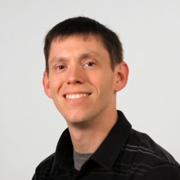Carl Schreck, Atmospheric Scientist, North Carolina Institute for Climate Studies, NCSU

Please include details about your educational background and what sparked your interest in atmospheric or related sciences.
I grew up in Raleigh, NC, and I vividly remember Hurricane Fran hitting our town, knocking out power, and closing schools for a week. The power of that storm inspired me to learn more about them.
I went to NCSU in my hometown for undergraduate and majored in Meteorology with minors in Math, Computer Programming, and Music Performance. I was lucky enough to participate in a couple of REU programs and learned how much I loved research. So I went to UAlbany for graduate school where I got my Masters and Ph.D. in Atmospheric Science.
What was your first job in the field and how did you end up in the job you are in now?
My first job was a postdoc with NCICS/NCSU, the group I still work with today. During graduate school, I worked hard to share my code, data, and anything else with the field. That led to collaborations that built my network and helped me land the postdoc position.
What opportunities did you pursue that you knew would be beneficial to securing a job in the profession?
I participated in two REU (Research Experiences for Undergraduates) programs. The first was the summer between my sophomore and junior years, which is earlier than most people try them. Then the second was between my junior and senior years and continued through my final year. These experiences gave me invaluable experience with research and helped me confirm my career path. They also led to my first publication!
What other courses/skills beyond the required math and science courses do you think would be the most helpful to individuals wanting a career in your profession?
I am very grateful that I minored in math and computer programming. Each only required a few courses beyond those that were required. If I were to do it over again, the only thing I would change is possibly double-majoring in one or the other.
Applied math and computer programming are such fundamental tools, not only in our field but throughout STEM. Having those in your toolbox makes everything easier, not to mention being more marketable.
Computer programming is also very much an artform. It makes a huge difference to know the "right" way to program and document your programs—both for your own debugging but even more for being able to share it later.
What is your typical day on the job like?
Mostly either writing or programming. It takes a lot of time to keep working on manuscripts but also other reports. I also spend a lot of time reading and editing work from my collaborators. I try to make time to read papers too, but that's the hardest thing to keep up with.
What do you like most about your job? What is the most challenging thing about your job?
I really enjoy programming. It can be frustrating at times, but it's amazing feeling when I finally solve a problem. I also love that I get to work on something that has real world applications. I'm always trying to find ways to collaborate with people in the private sector and in operational forecasting.
The biggest challenge is time management. Every project seems fun and interesting, but there just isn't enough time to do them all.
Does your job allow for a good work/life balance? If not, why?
Yes. Working in a government allows for a more normal 40-hour work week than you might find in a regular academic position. I'm also very lucky that our supervisors have embraced teleworking and are understanding when things come up and I have to flex my schedule.
Like many people, I went into college planning to go into the weather or broadcasting. It didn't take me long to realize the hours that those industries have to keep, which I expect would be a lot harder on that work/life balance.
Over the course of your career what is the most exciting thing that has happened to you?
Getting my first grant funded. It's always a joy when a paper is accepted too, but a grant means that someone else thinks that you and your idea are worth spending money on. It's a huge validation of all the hard work.
Is there anything you wish you had done differently in your career?
A postdoc can be a chance to try something completely different, both in terms of field and also lifestyle/location. I went with a fairly safe option by going somewhere close to where I grew up and in a position that allowed me to build directly from my PhD research.
I can't complain because it led to my current job and lifestyle, both of which I love. But it does feel like a missed opportunity.
What are some ‘must haves’’ on a resume if a person wants to gain employment in your field?
Strong computer programming skills is first and foremost. A close second would be anything that can demonstrate strong written communication skills.